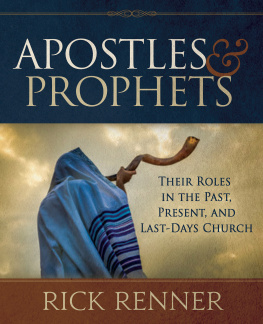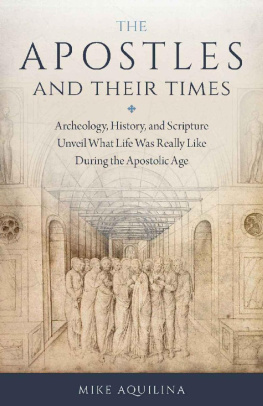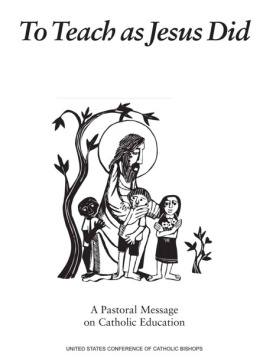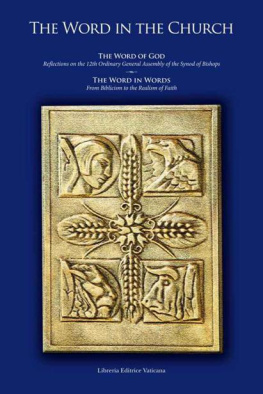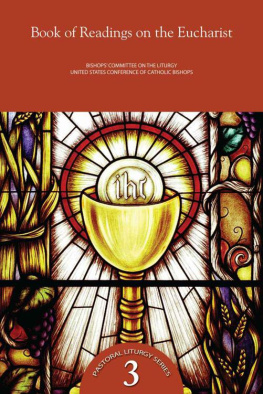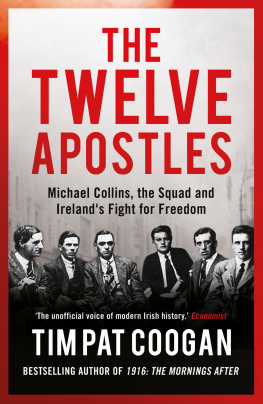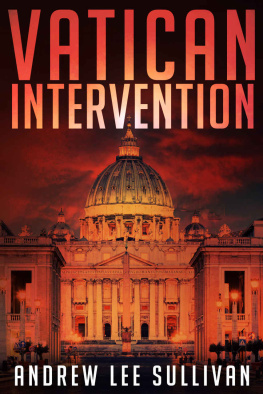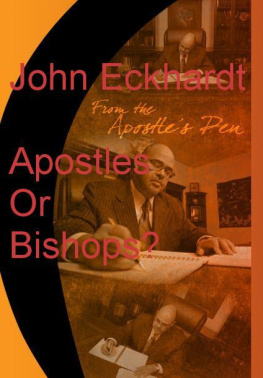By Francis A. Sullivan - From Apostles to Bishops
Here you can read online By Francis A. Sullivan - From Apostles to Bishops full text of the book (entire story) in english for free. Download pdf and epub, get meaning, cover and reviews about this ebook. year: 2014, publisher: Paulist Press, genre: Religion. Description of the work, (preface) as well as reviews are available. Best literature library LitArk.com created for fans of good reading and offers a wide selection of genres:
Romance novel
Science fiction
Adventure
Detective
Science
History
Home and family
Prose
Art
Politics
Computer
Non-fiction
Religion
Business
Children
Humor
Choose a favorite category and find really read worthwhile books. Enjoy immersion in the world of imagination, feel the emotions of the characters or learn something new for yourself, make an fascinating discovery.

- Book:From Apostles to Bishops
- Author:
- Publisher:Paulist Press
- Genre:
- Year:2014
- Rating:3 / 5
- Favourites:Add to favourites
- Your mark:
- 60
- 1
- 2
- 3
- 4
- 5
From Apostles to Bishops: summary, description and annotation
We offer to read an annotation, description, summary or preface (depends on what the author of the book "From Apostles to Bishops" wrote himself). If you haven't found the necessary information about the book — write in the comments, we will try to find it.
From Apostles to Bishops — read online for free the complete book (whole text) full work
Below is the text of the book, divided by pages. System saving the place of the last page read, allows you to conveniently read the book "From Apostles to Bishops" online for free, without having to search again every time where you left off. Put a bookmark, and you can go to the page where you finished reading at any time.
Font size:
Interval:
Bookmark:
From Apostles to Bishops
The Development of the Episcopacy in the Early Church
By Francis A. Sullivan, S.J.

Paulist Press
New York/Mahwah, N.J.
Scripture selections are taken from the New American Bible with Revised New Testament and Psalms Copyright 1991, 1986, 1970 by the Confraternity of Christian Doctrine, 3211 Fourth St., N.E., Washington, D.C. 20017-1194 and are used by license of the copyright owner. All rights reserved. No part of the New American Bible may be reproduced in any form without permission in writing from the copyright owner.
The Publisher gratefully acknowledges use of the following: Excerpts from Teaching Authority in the Early Church (Message of the Fathers of the Church, vol. 14) by Robert Eno, S.S. Copyright 1984. Used by permission of Liturgical Press. Excerpts from Tertullian: Treatises on Penance (Ancient Christian Writers, no. 28) translated by William P. LeSaint, S.J. Copyright 1959. Used by permission of Paulist Press. Excerpts from The Letters of Cyprian of Carthage (Ancient Christian Writers, nos. 43, 44, 46, 47) translated by G.W. Clarke. Copyright 198489. Used by permission of Paulist Press. Excerpts from Eusebius Pamphili: Ecclesiastical History (Fathers of the Church, vol. 19) translated by Roy J. Deferrari. Copyright 1953. Used by permission of The Catholic University of America Press. Excerpts from The Treatise on the Apostolic Tradition of St. Hippolytus of Rome edited by Gregory Dix and Henry Chadwick. Copyright 1992. Used by permission of Curzon Press. Excerpts from Early Christian Fathers (Library of Christian Classics) edited by Cyril C. Richardson. Used by permission of Westminster John Knox Press. Excerpts from Ecclesiastical Authority and Spiritual Power in the Churches of the First Three Centuries by Hans von Campenhausen. Used by permission of Continuum Publishing.
The Newman Press is a trademark of Paulist Press, Inc.
Copyright 2001 by The Society of Jesus of New England
All rights reserved. No part of this book may be reproduced or transmitted in any form or by any means, electronic or mechanical, including photocopying, recording, or by any information storage and retrieval system without permission in writing from the Publisher.
Library of Congress Cataloging-in-Publication Data
Sullivan, Francis Aloysius.
From apostles to bishops : the development of the episcopacy in the early church / by Francis A. Sullivan.
p. cm.
Includes bibliographical references and index.
ISBN 0-8091-0534-9 / EISBN 978-1-61643-627-8
1. EpiscopacyHistory of doctrinesEarly church, ca. 30600. I. Title.
BX1905 .S85 2001
262.1213dc21
2001032736
Jacket design by Cheryl Finbow.
Produced by Paulist Press
997 Macarthur Boulevard
Mahwah, New Jersey 07430
www.paulistpress.com
Contents
On October 31, 1999, Edward Cardinal Cassidy, president of the Pontifical Council for Promoting Christian Unity, and Bishop Christian Krause, president of the Lutheran World Federation, signed a Joint Declaration on the Doctrine of Justification. The signing of this Joint Declaration meant that, after years of patient dialogue, the Catholic Church and the churches belonging to the Lutheran World Federation agreed that they no longer considered the doctrine of justification by Gods grace through faith in Christ to be a church-dividing issue.
In the light of the agreement achieved on this question, which had for so long seemed a great barrier separating Catholics not only from Lutherans but from most Protestants as well, many Christians might think that now no formidable barriers stand in the way of restoring full communion between the churches.
In fact, however, some truly church-dividing issues remain. One such issue concerns the significance of episcopal ordination in the apostolic succession. The Catholic Church, the Orthodox and other Eastern churches, and most churches of the Anglican Communion teach that episcopal ordination in the apostolic succession is necessary for valid orders and ministry. While many Protestant churches do have bishops, none of them agrees that the validity of their orders and ministry depends on episcopal ordination in the apostolic succession. Few of them actually claim to have maintained the historic succession, and none admits that the lack of it renders their ministry or Eucharist invalid. Furthermore, Catholics hold that episcopal ordination confers on bishops a teaching role that is authoritative, and in some cases, infallible. No Protestants agree with this belief. These differences follow from the different answers given to an even more basic question: Is the episcopate the result of a purely human, historical development or is it of divine institution? While Protestants, who see the episcopate as the result of a purely human development, consider it a possibly useful, but not obligatory way to organize ministry, Catholics believe it to be an indispensable element of the divinely ordered structure of the Church.
The question whether the episcopate is of divine institution continues to divide the churches, even though Christian scholars from both sides agree that one does not find the threefold structure of ministry, with a bishop in each local church assisted by presbyters and deacons, in the New Testament. They agree, rather, that the historic episcopate was the result of a development in the postNew Testament period, from the local leadership of a college of presbyters, who were sometimes also called bishops (episkopoi), to the leadership of a single bishop. They also agree that this development took place earlier in the churches of Syria and western Asia Minor, than it did in those of Philippi, Corinth and Rome. Scholars differ on details, such as how soon the church of Rome was led by a single bishop, but hardly any doubt that the church of Rome was still led by a group of presbyters for at least a part of the second century.
The question that divides Catholics and Protestants is not whether, or how rapidly, the development from the local leadership of a college of presbyters to that of a single bishop took place, but whether the result of that development is rightly judged an element of the divinely willed structure of the church. This question asks about the theological significance of a postNew Testament development, which history alone cannot answer. On the other hand, accurate knowledge of the history proves essential to arriving at the answer, for the question is whether the historical development took place in such a way that the resulting episcopate can rightly be deemed an essential element of the structure God willed for the church. An accurate knowledge of the history is also necessary in avoiding assertions about the link between the apostles and the bishops that cannot stand the test of historical investigation or critical exegesis.
In this book I present the historical development of the ministry of leadership in the early Church, beginning with the New Testament and ending with Saint Cyprian, the bishop of Carthage during the middle years of the third century. For the first part of this history, the reader will have the texts available in the New Testament. Early Christian writings after the New Testament are not so easily available, and for that reason I include passages of the works of that period that throw light on the development of the episcopate. As I have said, history alone cannot give the answer to the question whether bishops are the successors of the apostles by divine institution, and therefore, in my final chapter, I offer what seem to me the best reasons to support that belief. While I write as a Roman Catholic, I hope Protestants who may read this book will find my presentation of the history objective, and that they will at least find reasonable the grounds I offer for believing that the episcopate is an element of the divinely willed structure of the church.
Next pageFont size:
Interval:
Bookmark:
Similar books «From Apostles to Bishops»
Look at similar books to From Apostles to Bishops. We have selected literature similar in name and meaning in the hope of providing readers with more options to find new, interesting, not yet read works.
Discussion, reviews of the book From Apostles to Bishops and just readers' own opinions. Leave your comments, write what you think about the work, its meaning or the main characters. Specify what exactly you liked and what you didn't like, and why you think so.

